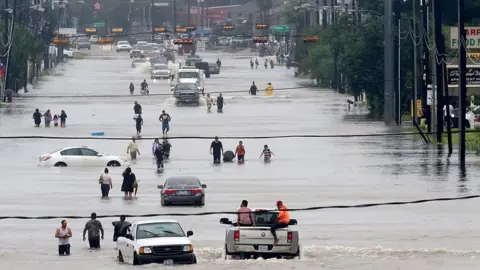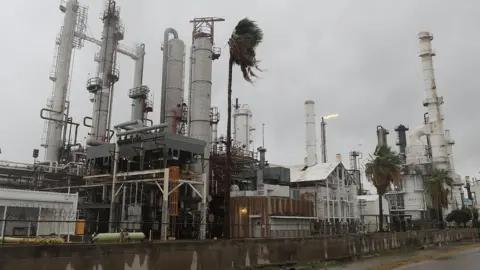'Unprecedented' storm causes billions in damage
 AFP/Getty
AFP/GettyMany refineries have shut and almost a fifth of oil and gas production in the Gulf of Mexico has been suspended amid the largest storm to hit in the US in more than a decade.
Hurricane Harvey has produced high winds and extensive flooding forcing thousands of people from their homes.
The closures are expected to cause a temporary spike in US gas prices.
Analysts expect the economic impact of the storm to pass $40bn (£31bn), with direct losses of over $20bn.
The storm's path through southeast Texas and the Gulf of Mexico has hit the heart of the US energy industry, an area home to almost half of US refining capacity and a fifth of its oil production.
Houston, where water has overwhelmed the streets, is also the base of one of America's largest ports.
US gas prices rose around 10% ahead of the storm, said Joseph Brusuelas, chief economist at RSM US.
He expects prices to jump by another 20-30% over the next two weeks in the Texas region, with less significant increases elsewhere, he said.
Food prices could also be affected, as shipments of wheat and soybeans are delayed, he added.
Globally the impact is likely to be smaller, since the US is not a major source of energy exports and supplies remain historically high.
 AFP/Getty
AFP/GettyAssuming the current weather forecast holds, Mr Brusuelas said he expects US prices to subside, as operations restart over the next two weeks.
Over the longer term, the havoc wreaked by the storm on businesses and households is likely to reduce energy demand in the US, analysts from Goldman Sachs predicted.
Houston is the fourth largest city in the US, and produces more than $500bn in economic activity annually.
US economic growth could slow by about a tenth of a percentage point in the quarter as a result of the storm, said Mr Brusuelas. The economy should rebound in the following six months, as spending increases on reconstruction and other efforts.
So far, oil and gas companies are focused on the immediate emergency and the safety of their personnel, without reports of major damages, said Bruce Jefferis, chief executive of Aon Energy, who is based in Houston.
About 18% of oil and natural gas production in the Gulf has stopped, according to the Bureau of Safety and Environmental Enforcement.
About 11% of all US refining capacity has also shut down, with others operating at reduced rates according to the most recent update from the US Department of Energy. Goldman Sachs put the figure higher at almost 17%.
'Unprecedented'
While big oil and gas companies are well-prepared for such abnormal weather, Mr Jefferis said the effect on families - many of whom are likely to be uninsured - and smaller businesses is likely to be far more significant.
"Truly this is an unprecedented storm for the Texas area," he said.
Hurricane Ike is estimated to have caused more than $12bn in insured damage when it hit Texas in 2008, with overall damages as high as $29bn.
Mark Hanna, spokesman for the Insurance Council of Texas, said it's clear that damages caused by Harvey are more significant, but he cautioned that numbers for damages that are surfacing now - as rain continues to fall - are premature.
"Nobody can put a figure like that on a storm at this moment," said Mr Hanna, whose organisation represents about 400 insurance companies.
"We know the losses are going to be extensive. When you have a city the size of Houston ... under water, that alone tells you you have a massive problem."
